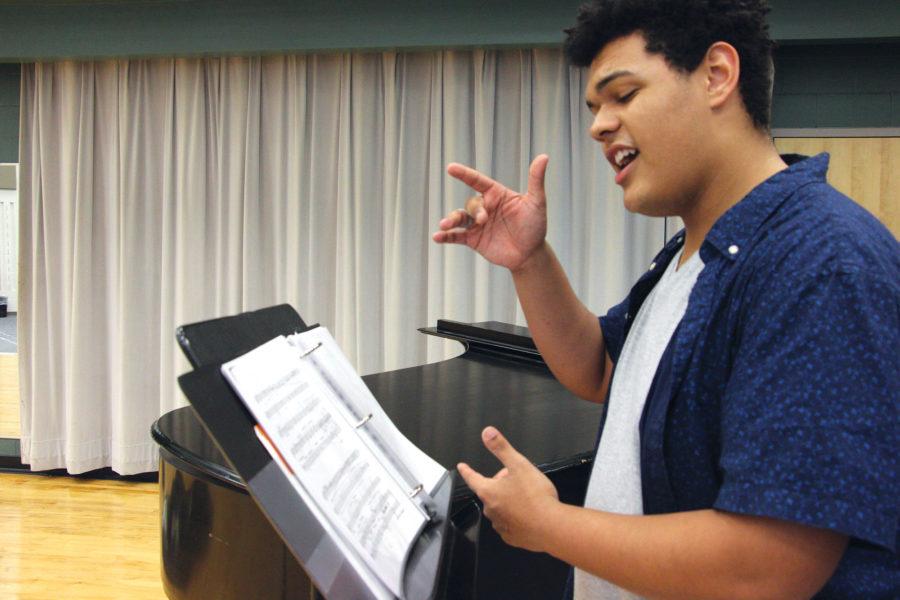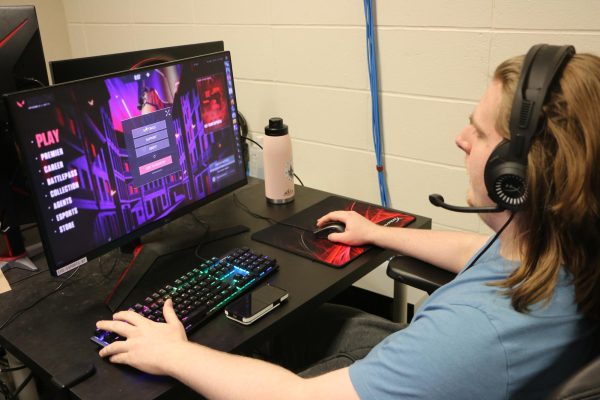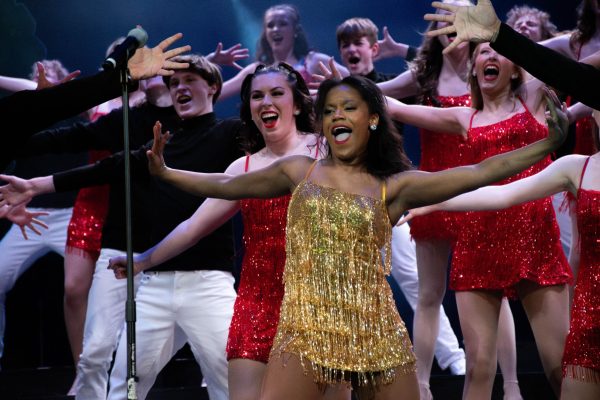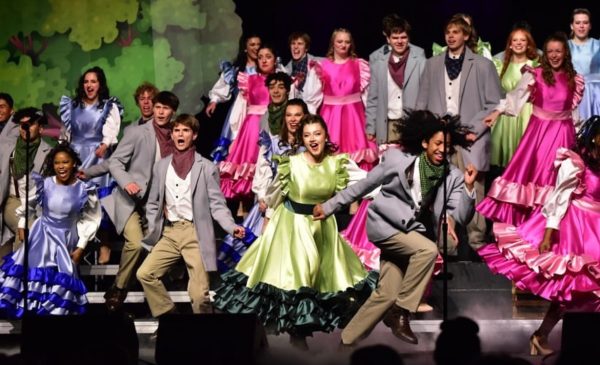Take Note: Students planning to pursue careers in musical theater audition for colleges

More stories from Jessica Konrad
March 22, 2019
Senior Jacob “Jake” Letts practices his audition music. Letts will be singing “My Defenses are Down” from the musical “Annie Get Your Gun.”
In the coming months, most seniors at this school will begin to hear back from colleges to which they applied and finalize their decisions for the future, finally drawing the lengthy college application process to a close. But for students like senior Jacob “Jake” Letts, the difficult portion of the application process has just begun. Instead of applying to a college in the traditional academic sense, Letts said he plans to audition for the musical theater programs of various colleges this spring.
For students interested in pursuing a career in musical theater like Letts, they are required to audition for the music schools of their choice instead of sending in a formal application. This process is designed to showcase the applicant’s abilities and display their talents to a panel of judges, helping the judges decide which applicants would be the best fit for their program.
“The application process is really time-consuming and stressful. I just want to get it all done,” Letts said.
Despite the lack of focus on academics in the audition process, receiving acceptance into these programs is extremely difficult.
College audition coach Kelly Smith said, “(Students need to know) that it’s harder to get into a musical theater performing arts program than it is to get into medical school. That’s what I want them to know.”
While being accepted into one of these schools in itself requires tremendous levels of dedication and perseverance, the audition process alone is also incredibly rigorous and challenging.
Smith said most musical theater auditions begin around 8 a.m. and can last until 6 p.m. To begin the day, auditions typically begin by conducting a brief question-and-answer session with auditioning students and their parents. Following this, the 30 to 40 students will change into comfortable clothes to begin the dance portion of the audition. Dancers will learn and perform various musical theatre jazz combinations, which usually takes 45 to 90 minutes. After this segment of the audition, individual auditions in which applicants will perform various song cuts and monologues. At some schools, students will also be expected to complete a music theory exam to conclude the audition process.
During these auditions the judges look for applicants to meet certain criteria and requirements.
Smith said judges’ main priority during evaluations is singing. Throughout the process, judges also look for marketability, acting and dance ability. The weight of these different categories varies depending on the school, but a student’s vocal ability is consistently the primary focus.
However, before students can even audition for school, they must begin the application process in the fall. Letts said the application process can begin as early as November and ends as late as the end of March.
Letts said, “(The prescreening) was the first step. For a lot of colleges I’ll have to do a prescreening, so I have to send in a video of me singing and acting, or just singing, or singing and dancing, those kind of things. That way they can see me. Then I will either pass the prescreening, which will let me go to get an audition, or I don’t.”
According to Smith, for students to successfully pursue a career in musical theater, they must truly have a passion for performing and be willing to prioritize it above all other aspects of their lives.
Smith said, “You have to really, really, really love it. You have to really think it’s the only thing that you can see yourself doing.”
Not only must students be willing to devote their lives to theatre, but according to Letts, it’s incredibly important for their families also to support them in this decision.
Eric Bembenek, a junior who plans to audition for college next year, said, “(My family) is super supportive, which is really nice because a lot of families aren’t when people choose to pursue theatre or music, so I’m really grateful to have a family that wants me to pursue what I like doing.”
Unlike other careers, Bembenek said, it’s crucial for students seriously pursuing a career in the arts to genuinely love and enjoy what they do, especially considering the instability of income with an artistic career, difficulty of acceptance into a school and the obstacles of developing a successful career after college.
“It is certainly a lot of fun and I just love performing and telling stories to an audience,” Bembenek said. “Obviously, getting a career afterwards is not as stable as other career fields, but also a big thing is just getting into a program because a lot of the colleges are super selective. Like a lot colleges are selective academically, but the ones that I want to go to are more selective talent-wise.”
Even if students are talented, hardworking and supported by their parents, for them to truly succeed in musical theater Letts said they must embody a passion for music in all they do. Music must be much more than simply a means of getting by, it must be their source of joy and happiness.
Letts said, “I have always loved the fact that simply me getting on a stage, whether that stage be a football field, an actual stage, a classroom, anything, the fact that I can go up and do what I love isn’t even work for me. Music isn’t work. For some people it is, but for me it’s what’s natural. It’s where I feel most at home. It’s what I love to do. It’s what has always brought me joy.”
While collegiate musical theater students seek to learn how to enthrall and amuse their patrons, once accepted in a musical theater program, Letts said he plans to channel his passion for music into much more than mere entertainment for the audience.
Letts said, “I’ve always believed that music has the power to change the world. I think that music is something that will forever unite people, the fact that I get to be a part of that. Music is not like a job, it’s a privilege. I have been blessed with the skill set and the talent that I will get to use to make people’s lives better and that’s amazing.”
Your donation will support the student journalists of Carmel High School - IN. Your contribution will allow us to purchase equipment and cover our annual website hosting costs.



















![Joseph Broman, Mu Alpha Theta sponsor, grades tests for his honors precalculus/trigonometry class. Broman said, “I’m retiring from the Math Club next year and I’m just going to do Mu Alpha Theta so I can focus on that one and we can do more [speaker series] first semester.”](https://hilite.org/wp-content/uploads/2024/03/IMG_9502-1200x900.jpg)











![British royalty are American celebrities [opinion]](https://hilite.org/wp-content/uploads/2024/03/Screenshot-2024-03-24-1.44.57-PM.png)




















![Review: “The Iron Claw” cannot get enough praise [MUSE]](https://hilite.org/wp-content/uploads/2024/04/unnamed.png)
![Review: “The Bear” sets an unbelievably high bar for future comedy shows [MUSE]](https://hilite.org/wp-content/uploads/2024/03/unnamed.png)
![Review: “Mysterious Lotus Casebook” is an amazing historical Chinese drama [MUSE]](https://hilite.org/wp-content/uploads/2024/03/0.webp)
![Thea Bendaly on her Instagram-run crochet shop [Biz Buzz]](https://hilite.org/wp-content/uploads/2024/03/IMG_0165-1200x838.jpg)
![Review: Sally Rooney’s “Normal People,” is the best book to read when you are in a time of change [MUSE]](https://hilite.org/wp-content/uploads/2024/03/20047217-low_res-normal-people.webp)
![Review in Print: Maripaz Villar brings a delightfully unique style to the world of WEBTOON [MUSE]](https://hilite.org/wp-content/uploads/2023/12/maripazcover-1200x960.jpg)
![Review: “The Sword of Kaigen” is a masterpiece [MUSE]](https://hilite.org/wp-content/uploads/2023/11/Screenshot-2023-11-26-201051.png)
![Review: Gateron Oil Kings, great linear switches, okay price [MUSE]](https://hilite.org/wp-content/uploads/2023/11/Screenshot-2023-11-26-200553.png)
![Review: “A Haunting in Venice” is a significant improvement from other Agatha Christie adaptations [MUSE]](https://hilite.org/wp-content/uploads/2023/11/e7ee2938a6d422669771bce6d8088521.jpg)
![Review: A Thanksgiving story from elementary school, still just as interesting [MUSE]](https://hilite.org/wp-content/uploads/2023/11/Screenshot-2023-11-26-195514-987x1200.png)
![Review: When I Fly Towards You, cute, uplifting youth drama [MUSE]](https://hilite.org/wp-content/uploads/2023/09/When-I-Fly-Towards-You-Chinese-drama.png)
![Postcards from Muse: Hawaii Travel Diary [MUSE]](https://hilite.org/wp-content/uploads/2023/09/My-project-1-1200x1200.jpg)
![Review: Ladybug & Cat Noir: The Movie, departure from original show [MUSE]](https://hilite.org/wp-content/uploads/2023/09/Ladybug__Cat_Noir_-_The_Movie_poster.jpg)
![Review in Print: Hidden Love is the cute, uplifting drama everyone needs [MUSE]](https://hilite.org/wp-content/uploads/2023/09/hiddenlovecover-e1693597208225-1030x1200.png)
![Review in Print: Heartstopper is the heartwarming queer romance we all need [MUSE]](https://hilite.org/wp-content/uploads/2023/08/museheartstoppercover-1200x654.png)


























![British royalty are American celebrities [opinion]](https://hilite.org/wp-content/uploads/2024/03/Screenshot-2024-03-24-1.44.57-PM-600x543.png)


![The new “Kung Fu Panda 4” movie: a journey of growth, self-realization and adventure [opinion]](https://hilite.org/wp-content/uploads/2024/03/po-600x294.png)

![Oscars season drama is inevitable with snubs (and not-snubs), but the drama is what makes it fun [opinion]](https://hilite.org/wp-content/uploads/2024/03/Screenshot-2024-03-10-2.11.32-PM-600x319.png)
![Despite Barbie Oscar snubs, Gosling deserves his nomination, exemplifies humility in Hollywood [opinion]](https://hilite.org/wp-content/uploads/2024/03/Screenshot-2024-03-09-5.45.40-PM-600x477.png)
